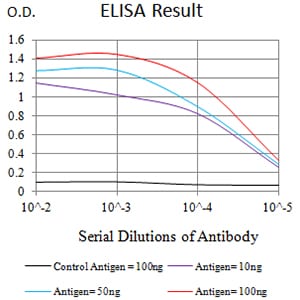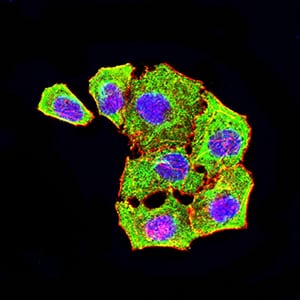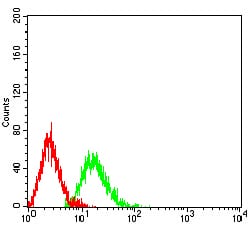


| WB | 咨询技术 | Human,Mouse,Rat |
| IF | 咨询技术 | Human,Mouse,Rat |
| IHC | 咨询技术 | Human,Mouse,Rat |
| ICC | 1/100 - 1/400 | Human,Mouse,Rat |
| FCM | 1/200 - 1/400 | Human,Mouse,Rat |
| Elisa | 1/10000 | Human,Mouse,Rat |
| Aliases | APG4A; AUTL2 |
| Entrez GeneID | 115201 |
| clone | 8C9C2 |
| WB Predicted band size | 45.4kDa |
| Host/Isotype | Mouse IgG2b |
| Antibody Type | Primary antibody |
| Storage | Store at 4°C short term. Aliquot and store at -20°C long term. Avoid freeze/thaw cycles. |
| Species Reactivity | Human |
| Immunogen | Purified recombinant fragment of human ATG4A (AA: 258-398) expressed in E. Coli. |
| Formulation | Purified antibody in PBS with 0.05% sodium azide |
+ +
以下是关于ATG4A抗体的3篇参考文献,按文献名称、作者及摘要内容简要概括:
1. **文献名称**:*ATG4A promotes tumor metastasis by inducing epithelial–mesenchymal transition in human hepatocellular carcinoma*
**作者**:Li Y, et al.
**摘要**:该研究通过Western blot和免疫组化技术,利用ATG4A抗体验证其在肝癌组织中的表达水平,发现ATG4A通过诱导上皮-间质转化(EMT)促进肿瘤转移,提示其作为肝癌治疗的潜在靶点。
2. **文献名称**:*Autophagy-related protease ATG4A regulates mitochondrial function and immune response in macrophages*
**作者**:Wang C, et al.
**摘要**:研究通过基因敲除和小鼠模型,结合ATG4A抗体的免疫荧光染色,揭示ATG4A通过调控线粒体自噬影响巨噬细胞免疫功能,为炎症性疾病机制提供新见解。
3. **文献名称**:*Differential expression of ATG4 family members in human cancers: A focus on ATG4A*
**作者**:Zhang X, et al.
**摘要**:该文献通过组织芯片和ATG4A抗体的免疫组化分析,比较了ATG4家族成员在多种癌症中的表达差异,发现ATG4A在结直肠癌中高表达且与患者预后不良相关。
如需更多文献或具体应用方向(如神经退行性疾病),可进一步补充说明!
ATG4A (Autophagy-related protein 4 homolog A) is a cysteine protease critical for autophagy, a conserved cellular degradation process. As a member of the ATG4 family (ATG4A-D), it specifically cleaves ATG8-family proteins (e.g., LC3. GABARAP) to expose a glycine residue essential for their conjugation to phosphatidylethanolamine on autophagosome membranes. This proteolytic activity, termed "priming," enables phagophore expansion and autophagosome formation. ATG4A also mediates "deconjugation" of lipidated ATG8 proteins during autophagosome maturation and cargo degradation.
Compared to its paralog ATG4B, ATG4A exhibits distinct substrate preferences, showing higher activity toward GABARAP subfamily proteins. Its expression varies across tissues, with implications in cancer progression. Studies link ATG4A dysregulation to tumors, where it may act as either an oncogene or tumor suppressor depending on context—e.g., promoting colorectal cancer metastasis while showing reduced expression in hepatocellular carcinoma.
ATG4A antibodies are vital tools for detecting protein expression, post-translational modifications, and subcellular localization in autophagy research. They enable applications like Western blotting, immunofluorescence, and immunohistochemistry, aiding studies on autophagy-related diseases (neurodegeneration, infection, cancer) and drug discovery. Validated antibodies help clarify ATG4A's role in maintaining proteostasis and its potential as a therapeutic target.
×